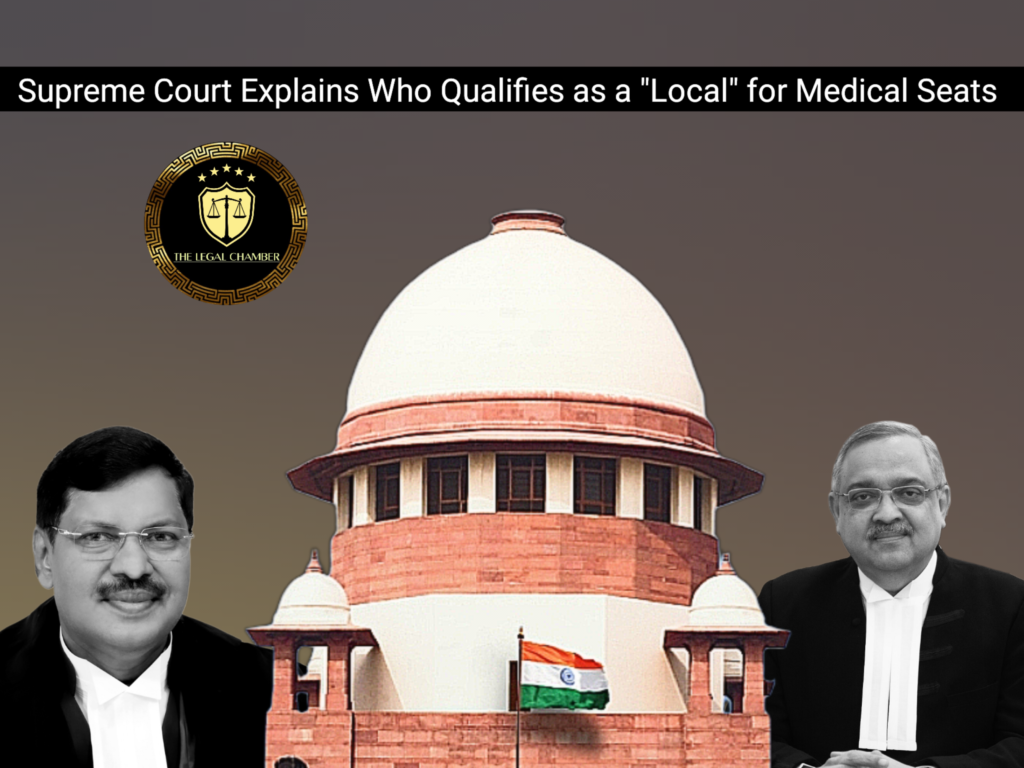The Supreme Court upheld the constitutional validity of Telangana’s rules defining ‘local candidates’ for medical admissions. It ruled that the classification, based on consecutive years of study/residence within the state, is not arbitrary and falls within the legislative competence under Article 371D, Entry 25 of List III, and the relevant Presidential Order.
Facts Of The Case:
The case originated from challenges to the Telangana Medical & Dental Colleges Admission Rules, 2017, and their 2024 amendment, which defined ‘local candidates’ eligible for 85% state quota seats. The definition required candidates to have studied in educational institutions within the state for four consecutive years ending with the qualifying examination, or to have resided there for the same period if not studying in an institution. Several students, who had completed most of their schooling in Telangana but moved outside the state for their final two years of secondary education (classes 11 and 12) due to parental transfers or other reasons, were rendered ineligible. They argued before the High Court that the rule was arbitrary and violated Article 14 of the Constitution for not accounting for such compelling circumstances. The Telangana High Court agreed, reading down the rules to include students who could produce a residence certificate. The State of Telangana appealed to the Supreme Court, contending that the High Court had overstepped by altering a legislative policy rooted in Article 371D and a Presidential Order, designed to ensure equitable opportunities and address the local shortage of medical practitioners.
Procedural History:
The procedural history of this case involves two primary stages of litigation. The dispute began with a batch of writ petitions filed before the High Court of Telangana, challenging the constitutional validity of the ‘local candidate’ definition in the state’s medical admission rules. In its judgment dated August 29, 2023, the High Court allowed the petitions, reading down the rules and expanding the definition. Following this, the state amended the rules in July 2024, which were again challenged and similarly struck down by the High Court on September 5, 2024. The State of Telangana and the university then filed the present appeals by way of special leave petitions before the Supreme Court, which, in its judgment dated September 1, 2025, allowed the state’s appeals and set aside the impugned judgments of the High Court.
READ ALSO :Supreme Court Sets Aside NGT Order, Rules Tribunal Can’t Outsource Its Decision-Making to Committees
Court Observation:
The Supreme Court made several key observations, firmly rejecting the High Court’s intervention. It held that the definition of a ‘local candidate’ was a deliberate legislative policy rooted in the objective of providing equitable opportunities under Article 371D of the Constitution. The Court observed that the requirement of four consecutive years of study or residence within the state, culminating in the qualifying exam, creates a valid presumption that such candidates are genuinely integrated with the local environment and are more likely to serve the people of the state after qualification. It emphasized that such classification is not arbitrary and is justified by a long line of precedent upholding similar residence-based requirements for admission to professional courses. The Court further noted that while individual hardships may occur, this alone cannot be a ground to invalidate a rule, as policy formulation is primarily the legislature’s domain. However, it took note of the state’s proposed proviso to mitigate hardship for children of certain government employees transferred outside the state.
Final Decision & Judgement:
The Supreme Court allowed the appeals filed by the State of Telangana and set aside the judgments of the High Court. It upheld the constitutional validity of the ‘local candidate’ definition under the Telangana Medical & Dental Colleges Admission Rules, both in their original 2017 and amended 2024 forms. The Court ruled that the rules, which require four consecutive years of study or residence within the state, are perfectly valid and in consonance with Article 371D and the enabling Presidential Order. Consequently, the writ petitions and special leave petitions filed by the student-aspirants were dismissed. However, the Court endorsed a prospective proviso offered by the State, which grants eligibility to children of certain government employees compelled to move outside Telangana, ensuring their admissions under the new rule would not be disturbed.
Case Details:
Case Title: The State of Telangana & Ors. vs. Kalluri Naga Narasimha Abhiram & Ors.
Citation: 2025 INSC 1058
Appeal Number: (Arising from Special Leave Petition (C) Nos. 21536-21588 of 2024)
Date of Judgement: September 1, 2025
Judges/Justice Name: Justice B. R. Gavai and Justice K. Vinod Chandran
Download The Judgement Here
